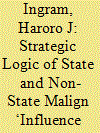|
|
|
Sort Order |
|
|
|
Items / Page
|
|
|
|
|
|
|
| Srl | Item |
| 1 |
ID:
086023


|
|
|
|
|
| Publication |
2009.
|
| Summary/Abstract |
In the last several years, a democratic boom has given way to a democratic recession. Between 1985 and 1995, scores of countries made the transition to democracy, bringing widespread euphoria about democracy's future. But more recently, democracy has retreated in Bangladesh, Nigeria, the Philippines, Russia, Thailand, and Venezuela, and the Bush administration's attempts to establish democracy in Afghanistan and Iraq seem to have left both countries in chaos. These developments, along with the growing power of China and Russia, have led many observers to argue that democracy has reached its high-water mark and is no longer on the riseThat conclusion is mistaken. The underlying conditions of societies around the world point to a more complicated reality. The bad news is that it is unrealistic to assume that democratic institutions can be set up easily, almost anywhere, at any time. Although the outlook is never hopeless, democracy is most likely to emerge and survive when certain social and cultural conditions are in place. The Bush administration ignored this reality when it attempted to implant democracy in Iraq without first establishing internal security and overlooked cultural conditions that endangered the effort.The good news, however, is that the conditions conducive to democracy can and do emerge -- and the process of "modernization," according to abundant empirical evidence, advances them. Modernization is a syndrome of social changes linked to industrialization. Once set in motion, it tends to penetrate all aspects of life, bringing occupational specialization, urbanization, rising educational levels, rising life expectancy, and rapid economic growth. These create a self-reinforcing process that transforms social life and political institutions, bringing rising mass participation in politics and -- in the long run -- making the establishment of democratic political institutions increasingly likely. Today, we have a clearer idea than ever before of why and how this process of democratization happens
|
|
|
|
|
|
|
|
|
|
|
|
|
|
|
|
| 2 |
ID:
171663


|
|
|
|
|
| Summary/Abstract |
Malign ‘influence activities’ conducted by state and non-state adversaries are one of the most pressing security challenges facing democracies globally. Haroro J Ingram offers a framework through which to understand the overarching strategic logic of a diverse spectrum of propaganda and disinformation threats targeting democratic populations. He argues that these activities seek to erode social trust, trust in authorities/expertise and trust in democracy, driving psycho-social and strategic effects that may contribute to the weakening of democratic institutions and processes. He concludes by identifying three strategic policy pillars that could be used to develop a more assertive posture for the protection and projection of democracy.
|
|
|
|
|
|
|
|
|
|
|
|
|
|
|
|
|
|
|
|
|